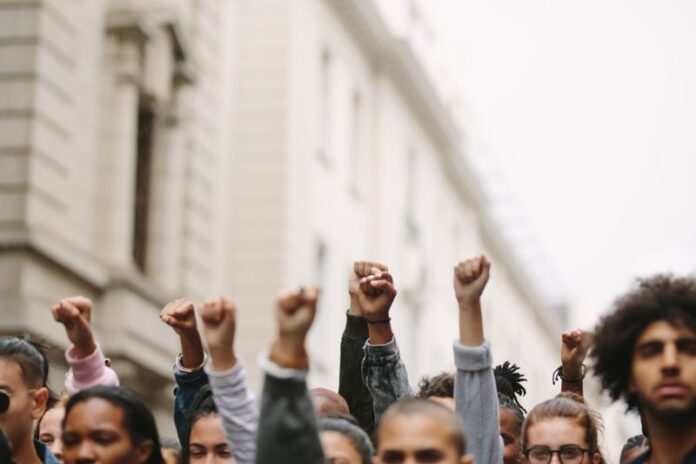During a 2016 Black Lives Matter protest in Baton Rouge, Louisiana, someone picked up a rock or a piece of concrete and hurled it at police, striking an officer in the head. Although the assailant was never identified, we know it was not BLM leader DeRay Mckesson, who nevertheless faces a lawsuit that blames him for creating the circumstances that led to the officer’s injuries.
The U.S. Court of Appeals for the 5th Circuit allowed that lawsuit to proceed, rejecting Mckesson’s claim that it was inconsistent with the First Amendment. Mckesson, represented by the American Civil Liberties Union, is now asking the U.S. Supreme Court to intervene, and he makes a compelling case that such litigation threatens the protest rights of Americans across the political spectrum.
The BLM demonstration was prompted by the July 2016 death of Alton Sterling, a 37-year-old Black man who was shot six times during a struggle with two Baton Rouge police officers. Although federal and state investigations concluded that criminal charges against the officers were not warranted, a wrongful death lawsuit by Sterling’s family led to a $4.5 million settlement in 2021.
The protest at the center of the civil case against Mckesson was staged outside the Baton Rouge Police Department four days after Sterling’s death. The injured officer, identified as John Doe in his original complaint and as John Ford in an amended complaint filed last August, suffered jaw, head and brain injuries.
Ford argues that Mckesson is responsible for those injuries because he negligently organized a protest that he should have known was apt to result in violence based on the experience with prior BLM demonstrations. According to the complaint, Mckesson also showed negligence by staging the protest in the street outside police headquarters, attempting to block traffic on a nearby highway, and failing to stop protesters from looting a convenience store, where some of them grabbed water bottles they later threw at police.
In a decision last June, a divided 5th Circuit panel deemed Ford’s allegations adequate to support a Louisiana tort claim and within the limits that the Supreme Court has imposed on protest leaders’ civil liability. But according to dissenting Judge Don Willett, that ruling misconstrued the Court’s 1982 decision in NAACP v. Claiborne Hardware Co., which said the First Amendment demands “precision of regulation” in addressing protests that combine constitutionally protected activity with threats or acts of violence.
The 1982 case involved a largely peaceful but sometimes violent boycott of white merchants in Claiborne County, Mississippi, that the National Association for the Advancement of Colored People launched in 1966. Unlike Mckesson, boycott organizer Charles Evers endorsed violence, saying, “If we catch any of you going in any of them racist stores, we’re gonna break your damn neck.”
Despite such rhetoric, the Supreme Court — which in 1969 had ruled that even advocacy of criminal behavior is constitutionally protected unless it is both “directed” at “producing imminent lawless action” and “likely” to do so — concluded that holding Evers civilly liable for protest-related violence would violate the First Amendment. If that was true for Evers, Willett argued, it certainly should be true for Mckesson.
“Under Claiborne, Mckesson cannot be liable for violence unless he encouraged violence,” Willett wrote. “It is not enough that he encouraged or committed unlawful-but-nonviolent actions that preceded violence.”
Willett noted that Martin Luther King Jr.’s civil rights protests, including the 1965 Selma to Montgomery march, sometimes blocked traffic and sometimes were marred by violence. By the 5th Circuit’s logic, he suggested, King could have been held liable for that violence, even though, like Mckesson, he did not “direct” it.
Willett warned that “the novel ‘negligent protest’ theory of liability” endorsed by his colleagues would have a chilling effect on constitutionally protected activities and “reduce First Amendment protections for protest leaders to a phantasm, almost incapable of real-world effect.” The Supreme Court has a chance to prevent that outcome by hearing Mckesson’s appeal.































